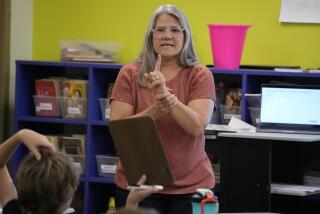Program Seeks to Keep Girls Involved in Math, Science : Education: New Jersey Institute of Technology enrolls fourth- and fifth-graders, hoping they will retain enthusiasm for the subjects as they grow older.
- Share via
NEWARK, N.J. — Eleven-year-old Tyisha Wright enjoys science and math, and her mother wants to make sure that interest lasts. But she’s concerned that teachers may not nurture her daughter’s enthusiasm.
“I think they encourage boys more to be good in science and math as the kids get older,” said Kim Wright. “I’m happy she likes math and science. I want it to stay that way.”
So Tyisha is enrolled in a new program at the New Jersey Institute of Technology designed to help fourth- and fifth-grade girls retain a love for the sciences as they enter their teens.
“If we don’t get them this young, many times it’s too late,” said Rosa Cano, a co-director of the program. “By the time many of them are teen-agers, they start forming opinions on what boys do and what girls do. They learn this notion that boys are naturally good in math and sciences and girls aren’t.”
Some experts, including the authors of a new book, say young girls are discouraged from studying math and science by their parents, teachers and peers. That leaves many young women with less of a chance to earn top wages, co-authors Myra and David Sadker argue in “Failing at Fairness: How America’s Schools Cheat Girls.”
The program at NJIT, a state university, is aimed at countering those negative influences.
“Girls have a very healthy esteem at this age,” co-director Diane Muldrow said. “But they get discouraged as they get older. They’re taught to be more interested in their looks and boys.”
Tyisha is one of 50 girls chosen from 200 applicants for the free program. Participants have to be in the top 10% of their class and have an interest in math and science.
Some of the classes are held in NJIT laboratories, where the girls are split into groups to compete against each other in math and science contests.
“It’s different,” 9-year-old Melissa Go-Alcantara said after a chemistry workshop. “It makes me want to learn more. I want to study chemistry.”
The girls will meet through June, take summer classes in July and attend a workshop in September. Cano and Muldrow are trying to raise money from corporations and other sources to continue the program.
Elizabeth Fennema, a professor at the University of Wisconsin Center for Education who has been studying gender bias in mathematics for more than 25 years, said she is surprised by renewed interest in the issue.
“It was a big topic about 15 years ago and then nobody spoke about it until five years ago,” said Fennema. “But it’s not just a feminist issue any more. Men now come when I speak. That rarely happened before.”
Fennema credits a 1992 report sponsored by the American Assn. of University Women, “How Schools Shortchange Girls,” with awakening people to the problem.
Susan McGee Bailey, who headed the team that wrote the report, said interest is growing as society becomes more technologically advanced.
“More jobs will require scientific and mathematical skills. It makes a difference in wages earned,” said Bailey, director of the Wellesley College Center for Research on Women in Massachusetts.
“There is definitely a lot of interest in trying to recruit more women into the sciences,” said Stephanie Bird, who teaches courses in ethical issues concerning the sciences at the Massachusetts Institute of Technology.
Larry Stowe, a high school physics teacher at Choate-Rosemary Hall, a private school in Wallingford, Conn., said changes in education must come in the lower grades.
“My introductory classes will be 50% female, but I lose most of the girls in the advanced classes,” he said. “I think girls from younger ages need to perceive they can have science careers before the situation really changes.”
More to Read
Sign up for Essential California
The most important California stories and recommendations in your inbox every morning.
You may occasionally receive promotional content from the Los Angeles Times.












